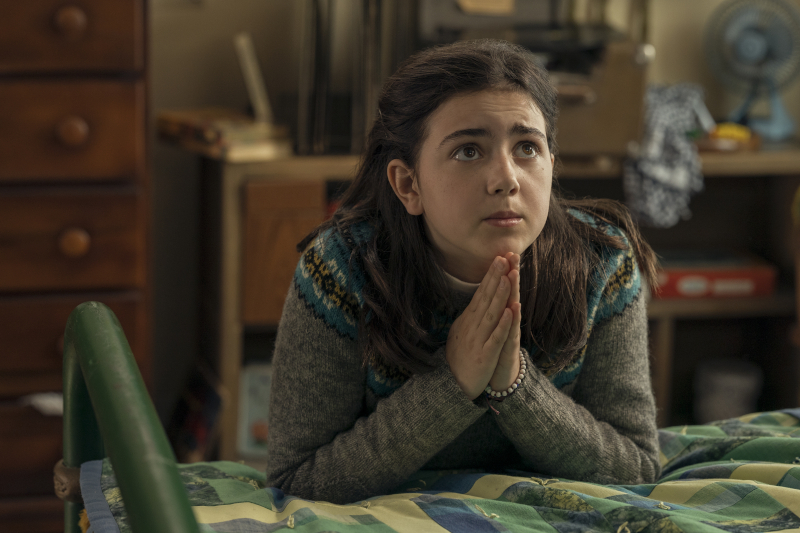Director – Kelly Fremon Craig – 2023 – US – Cert. PG – 105m
****
An 11-year-old girl navigates the difficult waters of religion and womanhood, talking privately to God as she does so – bestselling novel adaptation is out on digital Tuesday, July 18th and on Blu-ray & DVD Monday, August 7th
Is God there, can you talk to God, and does doing so make any difference? 11-year-old Margaret Simon (Abby Ryder Fortson) talks to God, beginning with the “Are You There?” question and then continuing to talk to God as if God’s presence were real. Whether God is real or not, the practice of talking with God has a history in certain Christian traditions, and probably in other religious traditions with which I’m less familiar too. It does not, of itself, prove the existence or non-existence of God one way or the other.
In terms of organised religion, Margaret finds herself in a confusing place. She is the sole child of Jewish father Herb (Benny Safdie) and Christian mother Barbara (Rachel McAdams) Simon. It’s a good marriage and the Simons are a very happy family, living in a cramped New York apartment with his Jewish mother Sylvia Simon (an hilariously dour yet joyous Kathy Bates).
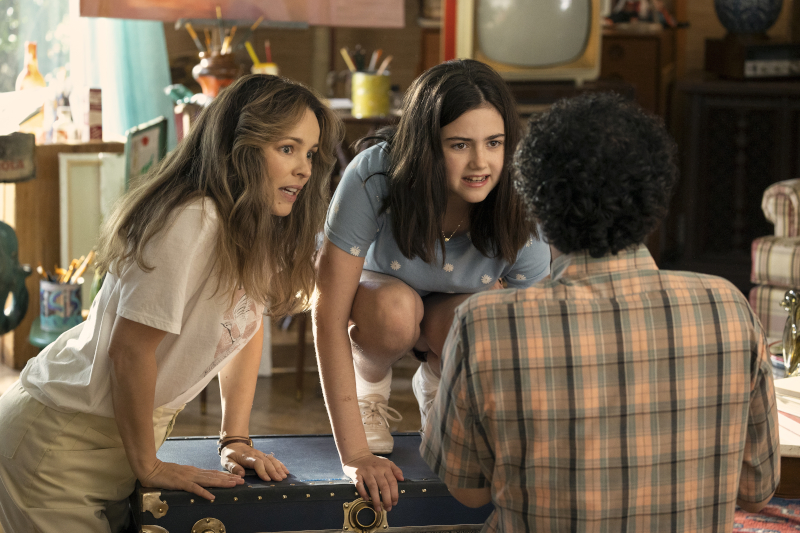
For both parents, their religious heritage is a part of their identity, at least nominally, but neither practices religion in terms of either synagogue or church attendance or any other outwardly visible, spiritual or social activity. Their attitude, vocalised more Barbara than Herb, is that their daughter should affiliate to no religion until her daughter decides that she wants to affiliate to one. To all intents and purposes, it’s an upbringing somewhere on the spectrum between agnosticism and atheism. And in her private talking to God, Margaret demonstrates that she’s not satisfied with it.
The family undergoes a major life change since Herb’s new work position means the couple have decided to move from urban New York to more suburban Jersey, something Margaret doesn’t want to do and when alone vocalises about to God, asking God to stop it happening or at least not let Jersey be too horrible. Barbara is thrilled to be able to give up teaching art and be around as a full-time mum for her daughter.
Before the family has even unpacked, Margaret has been befriended by outgoing neighbour her own age Nancy Wheeler (Elle Graham) and is soon invited to become the fourth member of Nancy’s secret club, the purpose of which appears to be to discuss matters of great feminine import, notably not wearing socks, boys, kissing, bras and bust sizes, menstruation and having your first period.
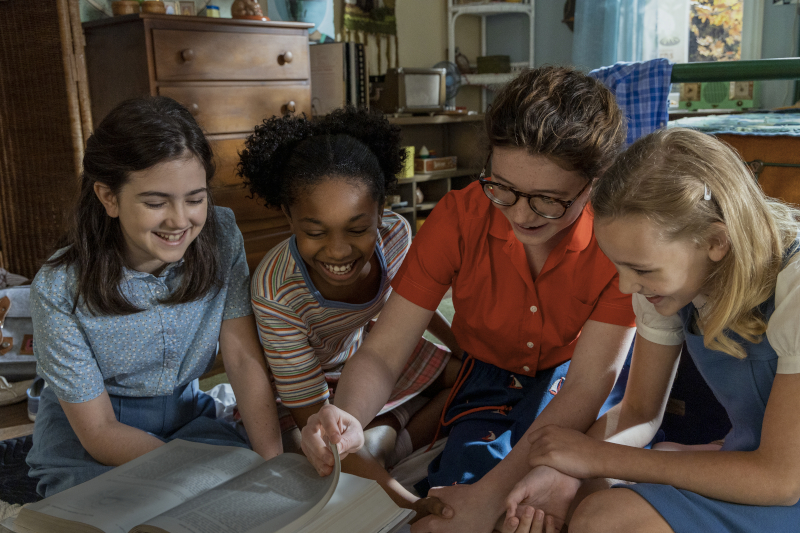
All four club members attend the same school class. The other two are Janie Loomis (Amari Price) and Gretchen Potter (Katherine Kupferer). Meeting after school, the first thing they do is decide the club rules. Margaret pitches in with the requirement of showing to each other the boy books they keep, and never lying. She comes unstuck on this pretty fast, because the other three all fancy the class heartthrob while she fancies the local boy despised by Nancy, Moose Freed (Aidan Wojtak-Hissong), who mows the lawns for five dollars, which desire she won’t reveal for fear of being ostracised. No-one ever asks to look at each others’ boy books, so she gets away with it. Much later, however, she catches Nancy out for lying and the pair fall out over it.
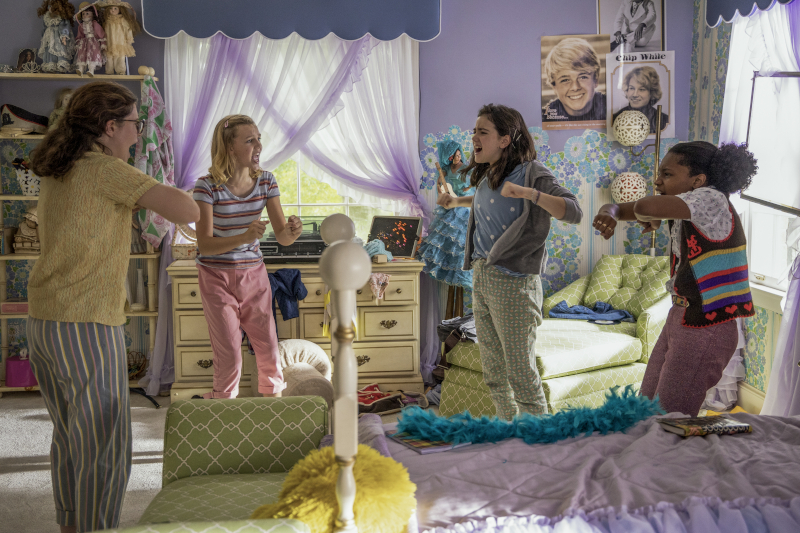
Before that, though, hilarious discussions ensue among the girls about feminine issues and attempts to do bust-enlarging exercises as a group. A nicely handled subplot involves Laura Danker (Isol Young), the girl in class who developed two years ahead of all the other girls and is shamed and avoided for it, and with whom Margaret later makes friends.
While Margaret is very much the centre of the film, parts of it make her mother Barbara and, to a lesser extent, her paternal grandmother Sylvia, the central character. On moving to Jersey prior to the start of her daughter’s new school year, Barbara volunteers for the three PTA committees, impressing their organiser, the beehive-hairdoed Jan Wheeler (Kate McCluggage) – Nancy’s mum – and proceeds to thrive on the committees; after a year, though, and towards the end of the film, she’s had enough and turns down being on Jan’s committees the following year. Instead, she’s back teaching a local art class and apparently enjoying the challenge. Sylvia, meanwhile, is seen enjoying a romantic entanglement while at her Florida hotel.
Lead actress Fortson has the difficult task of carrying the film, but she does so most effectively, making Margaret a believable flesh and blood character grappling with confusing adolescent ideas of religion and femininity. McAdams gives an unshowy, lean performance that accurately captures a woman painfully cut off by unfortunate family circumstances from her religious heritage, but just getting on with living a life as full as she can. And there’s something of the likeable curmudgeon in Bates’ life-affirming, Jewish matriarch.
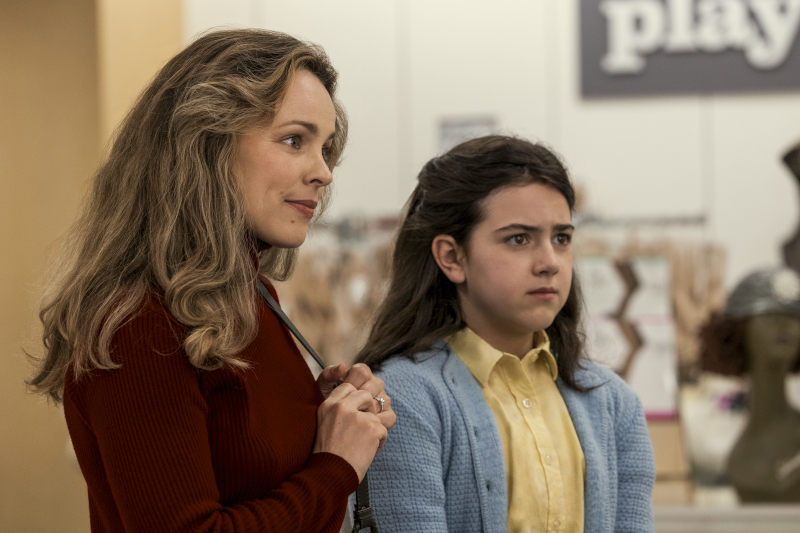
Director Craig, who also adapted the script from Judy Blume’s bestseller, possesses a rare gift for making every actor count. Many tiny walk-on parts, which would be forgettable in other films, are memorable, among them a friendly mailman (Dennis Delamar) delivering the post, a librarian upset by people talking (Gazelle Fleming) and a shop assistant (Karen Aruj) selling a bra to a Margaret determined to buy one before she is physically required to wear one.
Depending on the viewer’s gender, the film either speaks to female adolescence or provides a welcome insight into it. Religion, how it works and its validity or otherwise in our modern world, forms another strand. I say modern world, but the book was published in 1970 and the film appears to take place in the early 1960s (historically, the beehive hairdo first appeared in 1960).
The class teacher Mr. Benedict (Echo Kellum) takes each student aside to discuss with them their research project for the year. Based on her answers to his initial “get to know you all” written questions, he suggests Margaret do something on religion. So, she sets about attending various gatherings for worship. No-one pushes her to attend these, it’s very much on her own initiative, attending with various people she knows. She keeps in constant touch with grandma in New York, visiting when she can, and on one occasion asks if she can go with her to synagogue, to which grandma is delighted to take her. It turns out to involve sitting in a room with others listening to readings in Hebrew, a language she doesn’t speak.
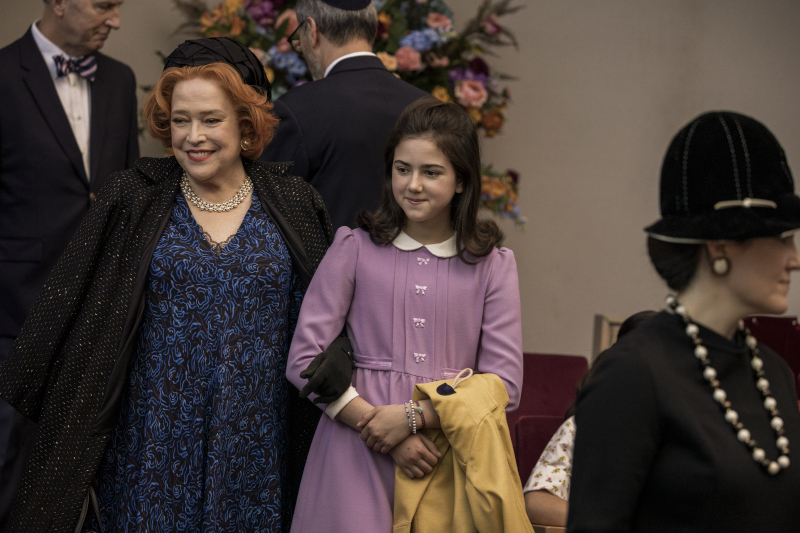
She also samples Janie’s lively Black church, complete with amazing, rousing, Black gospel singing; a more austere white protestant church with pulpit and sermon (edited so as to barely dwell on the content of the preaching) and attempts to visit the confessional at Laura’s Catholic church, quickly leaving the booth when she finds herself unable to talk at any great length to the priest behind the screen.
All these are one-off visits. Most of these places of worship seem commendably open to visiting strangers, without trying to ram anything down their throat, With not one of them does Margaret feel attracted enough to attempt any sort of regular attendance, but nor do any of them engender hostility within her. Curiously, none of them seem to connect with her ongoing talking with God, to whom she talks about all this stuff, which suggests some basic religious sensibility on her part.
The big religious bombshell comes when Margaret broaches the subject to her mother of why she’s never met her mother’s parents and Barbara reveals to her daughter that her parents, devout Christians, disowned her for marrying a Jew. This prompts Barbara to send her parents a Christmas card for the first time since she married, which produces a letter saying they’re coming to visit. This in turn precipitates a minor crisis, not least since Margaret has been invited to visit Grandma Sylvia in a Florida holiday hotel, but ends up with Sylvia (with new-found boyfriend in tow) turning up unexpectedly while Barbara’s parents Paul and Mary Hutchins (Gary Houston and Mia Dillon) are visiting.
Everything seems to be going smoothly until the Christian parents are discovered in the sitting room alone with their granddaughter attempting to proselytise her. We see the discovery rather than being privy to exactly what was said among the three, but after the Christian grandparents have been stopped, we are presented with Margaret, alone, asking God why religion makes people behave in the ways it does. A very good question.
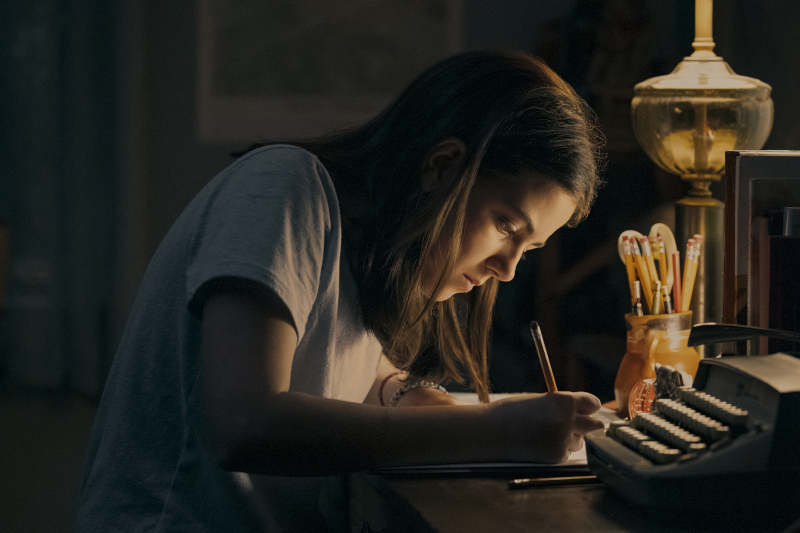
By the end, Margaret has almost embraced the atheism / agnosticism of her parents. Almost. She decides that God isn’t really real. And then, she’s alone, still asking, “Are you still there, God? It’s me, Margaret.”
What’s portrayed here appears to be a form of personal faith in God that lacks either any form of organised religious community or any engagement with religious texts or ideas. Margaret’s various visits to various places of Judeo-Christian worship never seem to get beyond the idea of them as spectacle or event; preaching or teaching is either in a language she doesn’t speak or something which happens ‘out there’ and with which she completely fails to connect. There’s no ethical, social or political angle to the religion pictured here either; for Margaret, religion seems to be something people do in church or synagogue, lacking any impact on the way they live their lives outside the religious area.
On the other hand, in its title and the religious thread of its subject matter, the film like the book before it puts the issue of God centre stage, even if it sometimes doesn’t seem to know quite how to get to grips with all that. It certainly isn’t preachy, though, and there’s a refreshing honesty about the storytelling here.
Are You There God? It’s Me, Margaret is out on digital Tuesday, July 18th and on Blu-ray & DVD Monday, August 7th following its release in out in cinemas in the UK on Friday, May 19th.
Trailer:
